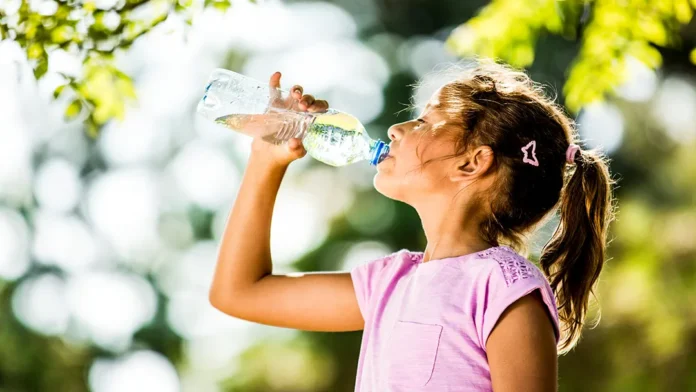Did you know that kids sweat less than grownups? Kids who play games or sports need to drink plenty of water so they can stay hydrated, especially if they’re outside in hot, humid weather.
- Drink water. Drinking water is the natural and healthy way for a kid to stay hydrated. Plain water doesn’t have any calories or energy-boosters like fruit juices and some sodas and sports drinks do. Don’t add any sweeteners or flavors.
- Be prepared. Kids should drink plenty of fluids before sports or playing outdoors.
- Get on schedule. Active or athletic children should drink fluids regularly. Help them avoid getting dehydrated by making up a “fluid schedule” so they can drink a certain amount before, during, and after practices, games, and meets. Kids should drink more if they are working out in hot, sunny, or humid conditions, or if they sweat a lot. Water intake should increase a few days before major games or tournaments.
Steps to Take to Prevent Dehydration During Sports
- Drink early. By the time a child gets thirsty, they may already be dehydrated.
- Drink enough. According to the American Academy of Pediatrics, a child of about 88 pounds should drink 5 ounces of cold water every 20 minutes. Children and teens around 132 pounds should drink 9 ounces of cold water every 20 minutes. One ounce is equal to two kid-size gulps.
- What to avoid: Caffeinated beverages (sodas, iced tea). Caffeine is a diuretic, meaning the kid might have to pee more, causing them to lose more fluid and become dehydrated even quicker.
How Do I Know if My Child is Dehydrated?
If your child has about any of the following symptoms, they may be dehydrated:
Home Care or Call the Doctor?
You may be able to help your child rehydrate at home.
- Have them continue to drink unsweetened fluids.
- Let them eat.
- Encourage them to rest.
- Keep an eye on them for other symptoms.
Call the doctor if:
- Any of their symptoms get worse.
- They have diarrhea.
- They are lethargic or sleepier than normal.
- They seem confused or pass out.
Analysis:
This is a great resource for resources parents follow to maintain their child’s hydration in day to day life. It lays out prevention methods and warning signs in a clear and concise way. It also speaks on the increased danger for dehydration in kids than adults.
Source:
WebMD. (n.d.). How to hydrate your active child. WebMD. Retrieved September 1, 2022, from https://www.webmd.com/parenting/active-child-hydrated




